现在完成时复习
- 格式:ppt
- 大小:908.00 KB
- 文档页数:3

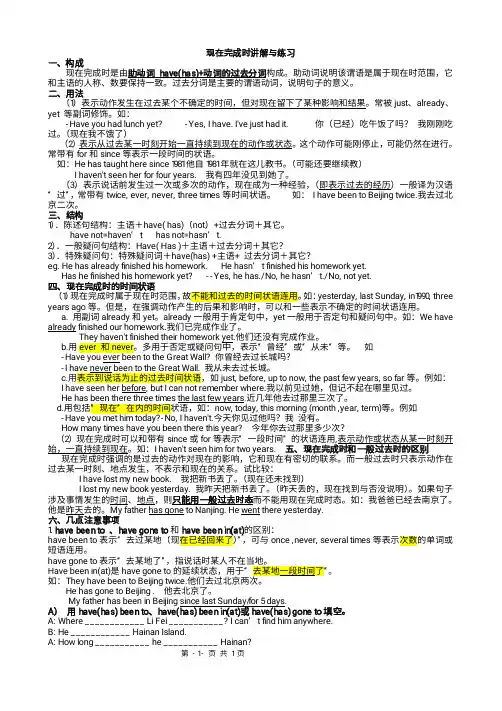
现在完成时讲解与练习一、构成现在完成时是由助动词h a v e(h a s)+动词的过去分词构成。
助动词说明该谓语是属于现在时范围,它和主语的人称、数要保持一致。
过去分词是主要的谓语动词,说明句子的意义。
二、用法(1)表示动作发生在过去某个不确定的时间,但对现在留下了某种影响和结果。
常被j u s t、a l r e a d y、y e t等副词修饰。
如:-H a v e y o u h a d l u n c h y e t?-Y e s,I h a v e.I'v e j u s t h a d i t.你(已经)吃午饭了吗?我刚刚吃过。
(现在我不饿了)(2)表示从过去某一时刻开始一直持续到现在的动作或状态。
这个动作可能刚停止,可能仍然在进行。
常带有f o r和s i n c e等表示一段时间的状语。
如:H e h a s t a u g h t h e r e s i n c e1981他自1981年就在这儿教书。
(可能还要继续教)I h a v e n't s e e n h e r f o r f o u r y e a r s.我有四年没见到她了。
(3)表示说话前发生过一次或多次的动作,现在成为一种经验,(即表示过去的经历)一般译为汉语“过”,常带有t w i c e,e v e r,n e v e r,t h r e e t i m e s等时间状语。
如:I h a v e b e e n t o B e i j i n g t w i c e.我去过北京二次。
三、结构1).陈述句结构:主语+h a v e(h a s)(n o t)+过去分词+其它。
h a v e n o t=h a v e n’t h a s n o t=h a s n’t.2).一般疑问句结构:H a v e(H a s)+主语+过去分词+其它?3).特殊疑问句:特殊疑问词+h a v e(h a s)+主语+过去分词+其它?e g.H e h a s a l r e a d yf i n i s h e d h i s h o m e w o r k.H e h a s n’t f i n i s h e d h i s h o m e w o r k y e t.H a s h e f i n i s h e d h i s h o m e w o r k y e t?--Y e s,h e h a s./N o,h e h a s n’t./N o,n o t y e t.四、现在完成时的时间状语(1)现在完成时属于现在时范围,故不能和过去的时间状语连用。



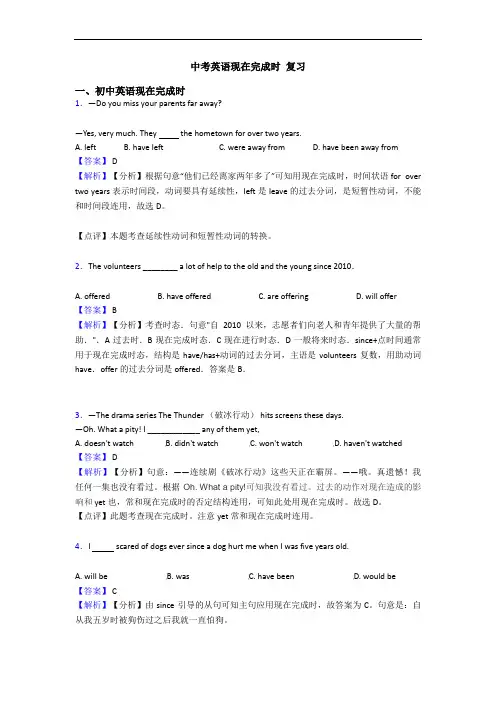
中考英语现在完成时复习一、初中英语现在完成时1.—Do you miss your parents far away?—Yes, very much. They the hometown for over two years.A. leftB. have leftC. were away fromD. have been away from【答案】 D【解析】【分析】根据句意“他们已经离家两年多了”可知用现在完成时,时间状语for over two years 表示时间段,动词要具有延续性,left是 leave的过去分词,是短暂性动词,不能和时间段连用,故选D。
【点评】本题考查延续性动词和短暂性动词的转换。
2.The volunteers ________ a lot of help to the old and the young since 2010.A. offeredB. have offeredC. are offeringD. will offer【答案】 B【解析】【分析】考查时态.句意"自2010以来,志愿者们向老人和青年提供了大量的帮助.".A过去时.B现在完成时态.C现在进行时态.D一般将来时态.since+点时间通常用于现在完成时态,结构是have/has+动词的过去分词,主语是volunteers复数,用助动词have.offer的过去分词是offered.答案是B.3.—The drama series The Thunder (破冰行动) hits screens these days.—Oh. What a pity! I ____________ any of them yet,A. doesn't watchB. didn't watchC. won't watchD. haven't watched【答案】 D【解析】【分析】句意:——连续剧《破冰行动》这些天正在霸屏。
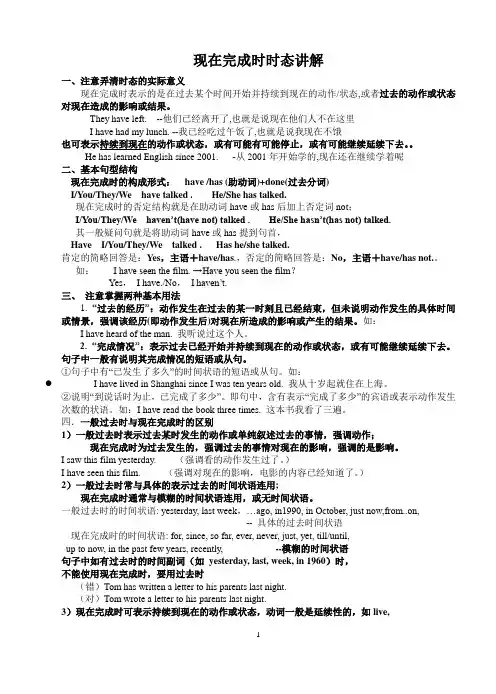
现在完成时时态讲解一、注意弄清时态的实际意义现在完成时表示的是在过去某个时间开始并持续到现在的动作/状态,或者过去的动作或状态对现在造成的影响或结果。
They have left. --他们已经离开了,也就是说现在他们人不在这里I have had my lunch. --我已经吃过午饭了,也就是说我现在不饿也可表示持续到现在的动作或状态,或有可能有可能停止,或有可能继续延续下去。
He has learned English since 2001. -从2001年开始学的,现在还在继续学着呢二、基本句型结构现在完成时的构成形式:have /has (助动词)+done(过去分词)I/You/They/We have talked . He/She has talked.现在完成时的否定结构就是在助动词have或has后加上否定词not;I/You/They/We haven’t(have not) talked . He/She hasn’t(has not) talked.其一般疑问句就是将助动词have或has提到句首,Have I/You/They/We talked . Has he/she talked.肯定的简略回答是:Yes,主语+have/has.,否定的简略回答是:No,主语+have/has not.。
如:I have seen the film. →Have you seen the film?Yes,I have./No,I haven’t.三、注意掌握两种基本用法1.“过去的经历”:动作发生在过去的某一时刻且已经结束,但未说明动作发生的具体时间或情景,强调该经历(即动作发生后)对现在所造成的影响或产生的结果。
如:I have heard of the man. 我听说过这个人。
2. “完成情况”:表示过去已经开始并持续到现在的动作或状态,或有可能继续延续下去。
句子中一般有说明其完成情况的短语或从句。

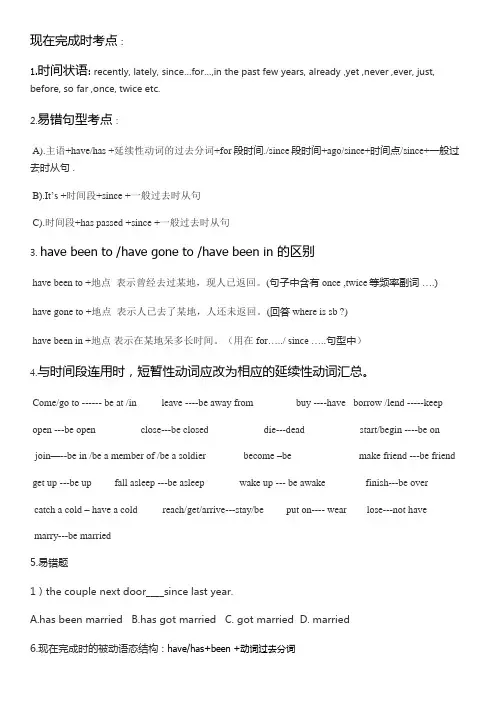
现在完成时考点:1.时间状语: recently, lately, since…for…,in the past few years, already ,yet ,never ,ever, just, before, so far ,once, twice etc.2.易错句型考点:A).主语+have/has +延续性动词的过去分词+for段时间./since段时间+ago/since+时间点/since+一般过去时从句 .B).It’s +时间段+since +一般过去时从句C).时间段+has passed +since +一般过去时从句3.have been to /have gone to /have been in 的区别have been to +地点表示曾经去过某地,现人已返回。
(句子中含有once ,twice等频率副词….)have gone to +地点表示人已去了某地,人还未返回。
(回答where is sb ?)have been in +地点表示在某地呆多长时间。
(用在for…../ since …..句型中)4.与时间段连用时,短暂性动词应改为相应的延续性动词汇总。
Come/go to ------ be at /in leave ----be away from buy ----have borrow /lend -----keep open ---be open close---be closed die---dead start/begin ----be onjoin—--be in /be a member of /be a soldier become –be make friend ---be friend get up ---be up fall asleep ---be asleep wake up --- be awake finish---be overcatch a cold – have a cold reach/get/arrive---stay/be put on---- wear lose---not have marry---be married5.易错题1)the couple next door____since last year.A.has been marriedB.has got marriedC. got marriedD. married6.现在完成时的被动语态结构:have/has+been +动词过去分词。
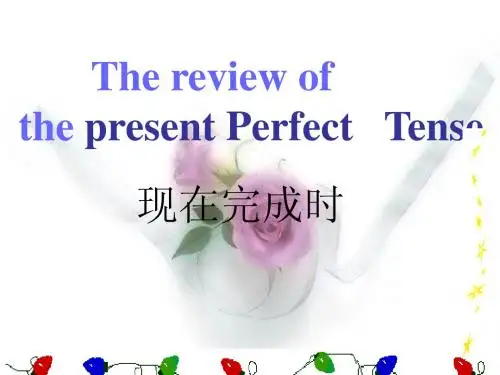

高考英语语法专题复习——现在完成时1.现在完成时的概念现在完成时指的是过去的动作或状态持续到了现在,对现在造成的影响,可能会持续发生下去。
现在完成时的标志词主要有:already已经、yet尚未(放于否定句和一般疑问句句末)、before在…之前、just刚刚和ever曾经;不断;总是。
2. 现在完成时的动词过去分词的变化规则(1)直接加ed,如:worked,played;(2)以不发音的e结尾,直接加d,如:lived,tasted;(3)辅音+y结尾,去y改i+ed,如:studied,fried;(4)重读闭音节结尾,双写最后一个辅音字母+ed,如:stopped,planned;(5)以c结尾,变c为ck+ed,如:picnic-picnicked,traffic-trafficked;(6)不规则变化,如:bring-brought,cut-cut,drive-driven;3.现在完成时的句型结构(1)基本结构:主语+have/has+动词的过去分词(p.p)(V-ed)现在完成时的基本构成方式是用动词have加上过去分词。
它是用来表达过去发生事情的另一种方式。
He has lost his wallet.他的钱包丢了。
She has had lunch,so she is not hungry now.她已经吃过午餐了。
We have seen that film before.之前我们已经看过那部电影了。
I have just finished my homework.我刚刚完成我的家庭作业。
(2)肯定句:主语+have/has+动词的过去分词(p.p)(V-ed)+宾语(have/has done)例句:I have told her the truth.我已经告诉了她真相。
I have found my schoolbag.我已经找到了我的书包。
We've had too much rain this year.今年雨水太多。
通用版高中英语现在完成时时态历年考试复习重点单选题1、How happy we are! The holiday we have been looking forward _______ at last.A.to has comeB.having comeC.to having comeD.has come答案:A解析:考查句子结构分析和谓语动词。
句意:我们是多么的快乐啊!我们一直所期望的假期终于来了。
句中we have been looking forward to我们一直所期望的,作the holiday的定语,故整个句子应当为The holiday has come at last。
故选A。
2、— you your homework yet?—Yes. I it a moment ago.A.Did; do; finishedB.Have; done; have finishedC.Have; done; finishedD.Will; do; finish答案:C解析:考查动词时态。
句意:——你完成你的作业了吗?——是的,我刚刚完成的。
第一句中,根据后文yet常与现在完成时连用,构成为have/has done,句中主语为you,助动词用have;第二句中根据后文a moment ago可知此处描述过去发生的动作应用一般过去时。
故选C。
3、That was not the first time he ____ us. I think it's high time we ____ strong actions against him. A.betrayed, takeB.had betrayed, tookC.has betrayed, tookD.has betrayed, take答案:B解析:考查时态和虚拟语气。
句意:那不是他第一次背叛我们。
我认为我们早该对他采取强硬措施了。
现在完成时现在完成时的用法: 现在完成时表示过去某时发生的行为对主语目前产生的影响。
现在完成时常被称为“与现在有联系的过去”,因此它不能与明确的过去时间状语连用。
现在完成时和一般过去时的比较①两者都可表示过去发生过的动作:但前者表示的是过去的动作对现在的影响,而后者则只是表示过去有这一动作的事实。
He locked the door. 他锁过门。
(但现在门是开是锁不清楚。
)He has locked the door. 他把门锁上了。
(现在门是锁着的。
)Who turned on the light? 谁开的灯?(着眼开灯的动作,不管现在灯是开是关。
)Who has turned on the light? 谁把灯打开了?(着眼开灯的结果,即现在灯还亮着。
)②两者都可表示过去开始并延续了一段时间的动作:现在完成时表示该动作仍在继续,而一般过去时则说明该动作现已终止。
He has lived in Beijing for four years.他在北京住了四年了。
(现在仍住那儿。
)He lived in Beijing for four years. 他曾在北京住了四年。
(现在不住那儿了。
)在下列情形下用现在完成时一.九个词语①already 已经(肯定句中或句尾)例: I have already found my pen. = I have found my pen already.②yet已经,仍然 (否定句和疑问句尾)例:I have not finished the work yet . Have you bought a computer yet?③ever曾经(句中)例:Have you ever seen pandas?④never从不(句中)例:I have never been to Beijing.⑤just 刚刚(句中)例:I have just done my work.⑥before以前(句尾) 例:I have never been there before.⑦so far到目前为止例:So far he has learnt 200 words.⑧how long 多久例:How long have you lived here?⑨how many times 多少次例:How many times has he been to Beijing?1) ______ two years 2) _______ two years ago 3) _______ last month4) ______ 1999 5) _______ yesterday 6) _______ 4 o’clock7) ______ 4 hours 8) _______ an hour ago 9) _______ we were children 10) _____ lunch time 11) ______ she left here12. He has lived in Nanjing ________ the year before last.13. I’ve known him __________ we were children.14. Our teacher has studied Japanese _________ three years.15. She has been away from the city ___________ about ten years.16. It’s about ten years __________ she left the city.17.I've been like this ever since _________ .st weekB.for a weekC.a week beforeD.the last week18.My mother has worked in this factory _____2 years.A.aboutB.forC.inD.since19. I haven't heard from him ______last week.A.sinceB.forC.agoD.before20.His father joined the party_________.A.for three yearsB.since three years agoC.three years agoD.in two years' time三.三词组Have/has gone to去了某地(还没回来) 例: He has gone to Beijing (去了北京) Have/has been to去过某地(已经回来) 例: He has been to Beijing. (去过北京) have(has) been in表示“在某地呆多长时间”,例:Mr. Brown has been in Shanghai for three days. 布朗先生来上海已经有三天了。
现在完成时时态讲解1)现在完成时通常表示过去发生或已经完成的某一动作对现在造成的影响和结果。
说话人强调的是该动作或状态对现在的结果或影响。
My daughter has just gone out. 我女儿刚出去。
I’m sure we’ve met before. 我肯定我们以前见过面。
She has arrived. 她到了。
2)表示开始于过去并持续到现在的动作或状态,往往和包括现在在内的表示一段时间的状语连用,如recently, already, yet, just, l ately, for…, since…,等。
如:I haven’t heard from her these days. 这些日子我没有收到她的信。
We haven’t seen you recently. 最近我们没有见到你。
They have been away for two years. 他们离开已经两年了。
She has been with us since Monday.3)现在完成时还可以用来表示过去的一个时间到现在这段时间内重复发生的动作.We have had four texts this semester.4). have been to 和have gone to的区别have been to 强调“去过”,现已不在那里,如:He has been to the USA three times.他到美国去过三次。
(过去“到美国”,现在已“不have gone to主要强调的是“去了”,现在人不在说话的现场在美国”)如:--Where's your mother? --你妈妈在哪?--She has gone to the hospital. --她去医院了。
一结构1.肯定句:主语+have/has+动词的过去分词+其他2.否定句:主语+have/has+not+动词的过去分词+其他3.一般疑问句:have/has+主语+动词的过去分词+其他Yes, 主语+have/has. No , 主语+have/has+not4.特殊疑问句:特殊疑问词+have/has+主语+动词的过去分词+其他二常和现在完成时一起连用的时间状语注意:.现在完成时不能单独与准确时间连用,(如表示过去的时间状语)如yesterday(morning、afternoon),last(morning、afternoon)等,除非与for, since 连用.1.现在完成时往往同表示不确定的过去时间状语连用如already(肯定), yet(否定,疑问), just, before, recently, still, lately,Just, already, yet, ever, never, before, twice(重复性时间),for+短时间,since+点时间,so far, how long 提问的疑问句中.......He has already obtained a scholarship.I haven't seen much of him recently (lately).We have seen that film before.Have they found the missing child yet ?2. 现在完成时常常与表示频度的时间状语连用, 如ever, never, twice,1 / 7several times等:Have you ever been to BeijingI have never heard Bunny say anything against her.I have used this pen only three times. It is still good.George has met that gentleman several times.3. 现在完成时还往往可以同包括现在时间在内的时间状语连用, 如up to these few days/weeks/months/years, just, up to present(now), so far等Peter has written six papers so far.Up to the present everything has been successful.三当现在完成时与表示短时间的时间状语连用时,谓语动词必须使用延续性动词。
现在完成时语法复习构成:have/has + 动词的过去分词用法:1.表示动作发生在过去或者已经完成对现在仍有影响。
I have lost my key.(钥匙在过去丢了,现在还没有找到)—Have you eaten your lunch?—Yes, I have. I have just eaten it.(现在不饿了)2.表示动作或状态在过去已经开始,并持续到现在,也许还要持续下去。
可以和表示一段时间的状语连用,表示持续的动作或状态多用延续性动词。
注意:表示一段时间的状语常用“since+时间点/从句”“for+时间段”表示。
Miss Liu has taught English for 20 years.We have known each other since 10 years ago.I haven’t seen you since you left here.3.表示到现在为止多次发生的动作。
I have read this book several times.My father has watched the film twice.标志词:already,yet,ever,recently,just,never,before(用于句末),so far,for+时间段,since+时间点/一般过去式的句子,in the past years……(1)already:已经,用于肯定句;yet:已经,还,用于否定句或疑问句。
注意:肯定句变否定句或者疑问句,要把already改为yet。
I have already finished my homework.I haven’t finished my homework yet.Have you finished your homework yet?(2)ever:曾经,用于疑问句或否定句中,放在助动词和过去分词之间。
Have you ever been to London?(3)just:刚刚,表示动作刚刚结束,常放在助动词与过去分词之间。